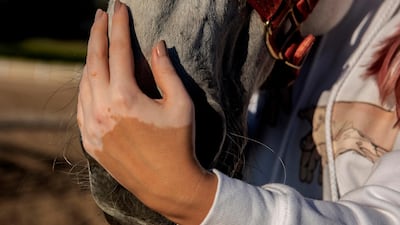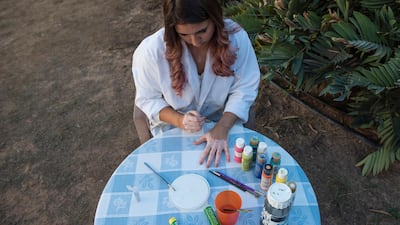For Nadin Al Maskari, her skin is nature's canvas on which she creates beautiful works of art.
Her hands, feet and thighs are covered in intricate and colourful patterns she is happy to share with the world.
The 32-year-old Emirati's flair for such personal creativity was inspired by the skin condition, vitiligo, which she developed when only 13.
It is a condition in which the skin loses its pigment cells, often resulting in discoloured patches on different parts of the body.
Ms Al Maskari likened the patches to a pattern and began to paint henna around it and posted the results to Instagram, a platform on which she has more than 1,400 followers.
Her artistry resonated particularly strongly - and positively - with those who also have vitiligo.
“I want to show people that there is a beautiful side to vitiligo and to look at it from that angle and not as a stigma or a skin disease. There are far worse things in the world," said Ms Al Maskari, from Abu Dhabi.
"We should not worry or think too much about what people think, we are the ones who have to live with it at the end of the day. If I can show it in a positive light then why not.”
For many around the world, vitiligo carries with it a social stigma and can lead to isolation, depression and loss of self-esteem.
Dr Shubhada Bichu, a specialist dermatologist at Burjeel Specialty Hospital, said that children with vitiligo can be singled out by bullies at school.
“Bullying does happen when it starts in childhood. School aged children are picked on, ridiculed and shunned by their friends," said Dr Bichu.
"For adults it is more of social stigma, patients will feel depressed especially if it is on a visible area like the face and hands and feet. It doesn’t affect the health of the patient but does affect the quality of life.”
The doctor said she sees one or two cases each month.
There is no cure for the disorder but there are therapies available to even out the skin tone.
It is a more common than you might imagine, affecting between 0.5 and 1 per cent of the world's population.
Ms Al Maskari does not use makeup to cover her skin and decided against pursuing laser treatment after trying it several years ago.
She is aware that her appearance can lead to many questions from other people, including how quickly the patches develop.
“It is sporadic, sometimes I get a new patch after three days and sometimes a couple of months or a year for one to develop,” she said.
Ms Al Maskari has never shied away from her condition and embraces who she is, though she is loathe to call herself an inspiration to others.
By helping herself to feel good, she hopes other people will feel more comfortable in their own skin as a result.
“I would like people to know that people who have vitiligo are beautiful as they are and I invite them to ask questions. The majority of us welcome questions.
"I do not see myself as inspirational, I really do it because it makes me feel good and I feel that my skin looks pretty," she said.









